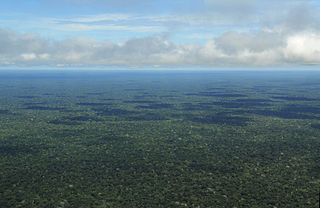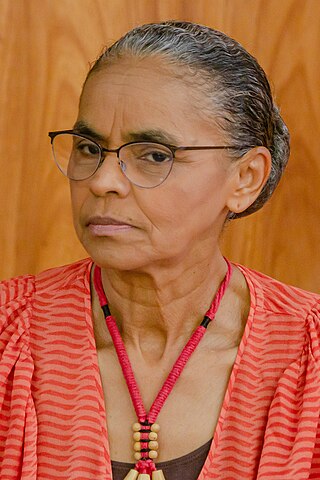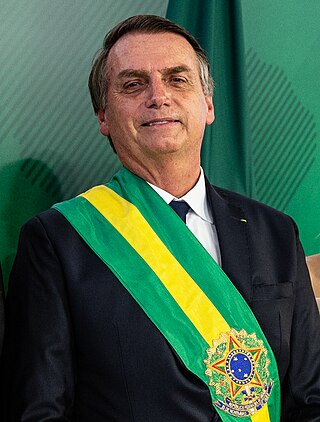
Deforestation or forest clearance is the removal of a forest or stand of trees from land that is then converted to non-forest use. Deforestation can involve conversion of forest land to farms, ranches, or urban use. The most concentrated deforestation occurs in tropical rainforests. About 31% of Earth's land surface is covered by forests at present. This is one-third less than the forest cover before the expansion of agriculture, with half of that loss occurring in the last century. Between 15 million to 18 million hectares of forest, an area the size of Bangladesh, are destroyed every year. On average 2,400 trees are cut down each minute.

The Amazon rainforest, also called Amazon jungle or Amazonia, is a moist broadleaf tropical rainforest in the Amazon biome that covers most of the Amazon basin of South America. This basin encompasses 7,000,000 km2 (2,700,000 sq mi), of which 5,500,000 km2 (2,100,000 sq mi) are covered by the rainforest. This region includes territory belonging to nine nations and 3,344 formally acknowledged indigenous territories.

Luiz Inácio Lula da Silva, also known as Lula da Silva or simply Lula, is a Brazilian politician who is the 39th and current president of Brazil. A member of the Workers' Party, he previously served as the 35th president of Brazil from 2003 to 2010.

Human rights in Brazil include the right to life and freedom of speech; and condemnation of slavery and torture. The nation ratified the American Convention on Human Rights. The 2017 Freedom in the World report by Freedom House gives Brazil a score of "2" for both political rights and civil liberties; "1" represents the most free, and "7", the least.

The Fundação Nacional dos Povos Indígenas or FUNAI is a Brazilian governmental protection agency for Amerindian interests and their culture.

Brazil once had the highest deforestation rate in the world and in 2005 still had the largest area of forest removed annually. Since 1970, over 700,000 square kilometres (270,000 sq mi) of the Amazon rainforest have been destroyed. In 2001, the Amazon was approximately 5,400,000 square kilometres (2,100,000 sq mi), which is only 87% of the Amazon's original size. According to official data, about 729,000 km² have already been deforested in the Amazon biome, which corresponds to 17% of the total. 300,000 km² have been deforested in the last 20 years.

The Guajajara are an indigenous people in the Brazilian state of Maranhão. They are one of the most numerous indigenous groups in Brazil, with an estimated 13,100 individuals living on indigenous land.

Maria Osmarina Marina da Silva Vaz de Lima, known as Marina Silva, is a Brazilian politician and environmentalist and current Brazil's Minister of the Environment and Climate Change. She is the founder and former spokeswoman for the Sustainability Network (REDE). During her political career, Silva served as a senator of the state of Acre between 1995 and 2011 and Minister of the Environment from 2003 to 2008. She ran for president in 2010, 2014 and 2018.

The Amazon rainforest, spanning an area of 3,000,000 km2, is the world's largest rainforest. It encompasses the largest and most biodiverse tropical rainforest on the planet, representing over half of all rainforests. The Amazon region includes the territories of nine nations, with Brazil containing the majority (60%), followed by Peru (13%), Colombia (10%), and smaller portions in Venezuela, Ecuador, Bolivia, Guyana, Suriname, and French Guiana.

Rates and causes of deforestation vary from region to region around the world. In 2009, two-thirds of the world's forests were located in just 10 countries: Russia, Brazil, Canada, the United States, China, Australia, the Democratic Republic of the Congo, Indonesia, India, and Peru.

Deforestation in Indonesia involves the long-term loss of forests and foliage across much of the country; it has had massive environmental and social impacts. Indonesia is home to some of the most biologically diverse forests in the world and ranks third in number of species behind Brazil and the Democratic Republic of Congo.
The Brazilian Forest Code is a piece of legislation passed in 1965. There has been controversy over the code, mostly centered on legal requirement for landowners in the Brazilian Amazon to maintain 80% of forests as legal reserves. This particular requirement has never been effectively implemented and implementation has again been delayed by President Luiz Inácio Lula da Silva until June 2011. The original law, passed in 1965, required only 50%. Neither this nor the 80% requirement have ever been prosecuted. This had been expected to change with harsher and criminal penalties to be introduced in 2009. Then President Luiz Inácio Lula da Silva however, delayed this until the post election period in 2011, though Presidential Decree number 7029.
José Cláudio Ribeiro da Silva was a Brazilian conservationist and environmentalist who campaigned against logging and clearcutting of trees in the Amazon rainforest.

Alexander Soros is an American philanthropist. One of the sons of billionaire George Soros, he is chair of the Open Society Foundations and one of the World Economic Forum's Young Global Leaders of 2018.
Rio Ronuro Ecological Station is an ecological station in the state of Mato Grosso, Brazil. It protects an area of contact between Amazon rainforest in the north and Cerrado semi-deciduous forest in the south. Since being created in 1998 it has been reduced in size and has suffered from significant deforestation.

Sônia Bone de Souza Silva Santos, usually known as Sônia Guajajara, is a Brazilian indigenous activist, environmentalist, and politician. A member of the Socialism and Liberty Party (PSOL), she was initially a candidate for President of Brazil in the 2018 Brazilian general election, before being chosen as the vice presidential running mate of nominee Guilherme Boulos. This made her the first indigenous person to run for a federal executive position in Brazil. In 2022, Guajajara was named one of the 100 most influential people in the world by Time.

The presidency of Jair Bolsonaro started on January 1, 2019, when he was inaugurated as the 38th president of Brazil, and ended on December 31, 2022, with the inauguration of the cabinet of Lula da Silva III on January 1, 2023. He was elected the president of Brazil on October 28, 2018, by obtaining 55.1% of the valid votes in the 2018 Brazilian general election, defeating Fernando Haddad. On October 30, 2022, Bolsonaro was defeated by Lula da Silva. In the years Brazil has been a democracy since 1985, Bolsonaro became the first president to lose an election as an incumbent.

Antônia Melo da Silva is a Brazilian human rights activist and environmentalist. In 2017, she received the Alexander Soros Foundation Award for Environmental and Human Rights Activism for leading campaigns against the construction of the Belo Monte Dam and other environmentally harmful projects in the Amazon rainforest.
Alessandra Korap is an indigenous leader and Brazilian environmental activist from the Munduruku ethnic group. Her main work is defending the demarcation of indigenous territory and denouncing the illegal exploitation and activities of the mining and logging industries. Alessandra is internationally recognized for her work. In 2020, she received the Robert F. Kennedy Human Rights Award in the United States. In 2023, Korap was awarded the Goldman Environmental Prize for South and Central America.

Alice Pataxó is a Brazilian indigenous climate activist. She gained national and international recognition after participating in the COP26 in Glasgow in 2021 as a spokesperson for the defense of the environment and indigenous rights. Alice was honored as one of the BBC 100 Women in 2022, after Malala Yousafzai nominated her for the award.















